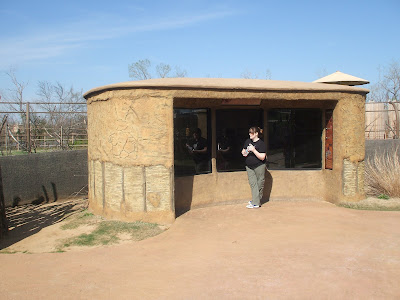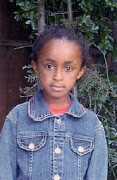



FABLES :: The Sun and the MoonIn the beginning the sun married the moon. They traveled together for a long time, the sun leading and the moon following. As they traveled, the moon would tire, so the sun carried her for three days every month. One day the moon made a mistake and was beaten by the sun. She fought back and wounded the sun’s forehead. The sun scratched the moon’s face and injured one of her eyes. When the sun realized that he was wounded, he was embarrassed and said to himself, “I am going to shine so hard hat people will not be able to look at me.” And now people cannot look at him without squinting. That is why the sun shines so brightly. The moon was not embarrassed; she did not have to shine any brighter. And even now, if you look closely at the moon, you will see the wounds that the sun inflicted on her during their fight.
ENKAI: The Maasai now believe in one diety, Enkai (meaning “sky”), whose duel nature is represented by the colors red and black. Enkai Narok, the black deity, brings rain and thunder to replenish the land. The red deity, Enkai Na-nyokie, brings lightening. At birth, Enkai gives each Maasai a guardian spirit to ward off danger and carry them away at the moment of death. The wicked are carried off to a desert, while the good dwell in a land of rich pastures and numerous cattle. According to the Maasai, the earth and sky were once joined together, they were suddenly torn apart, and only wild fig trees remained as bridges between the two. As a gift to the Maasai, Enkai send herds of cattle to the earth through the roots of these trees. Therefore, the Maasai believe that all cattle belong to them, and they are notorious cattle rustlers. A Maasai would never break ground for any reason. They believe that cultivating the land makes it unsuitable fro grazing. Milk and grass are considered sacred and are used to bestow blessings. Wildlife is also sacred. The Maasai will hunt only “wild cattle” (eland and buffalo) for food, but will hunt predators threatening their herds.
MAASI PROVERBSEngai tajapaki tooinaipuko inona --> God, shield me with your wings.Menang’ sillig kewan facing backwards does not perform itself --> Everyone has a part to play no matter how small. Therefore people do not ignore a small act, for it is just as essential as a big oneMemut elekunya nabo eng’eno --> One head cannot contain all knowledge. There are limits to one person’s knowledgeRIDDLESThe Maasai enjoy 2 types of riddles. Lloyietia are simple riddles and begin with the word “oyiote”, meaning “are you ready?”. The audience responds with “ee-wuo” which means, “it has come”. Lland’eni are complex proverbs meant for the very clever. They begin with the question “Ira ng’en” (“Are You clever?”). Of course the answer is “yes!”Kidung’ ang’ata bkira aare nimiking’amaro? --> lyie oloip linoThe two of us cross the wilderness without talking to each other. --> you and yourshadow



No comments:
Post a Comment